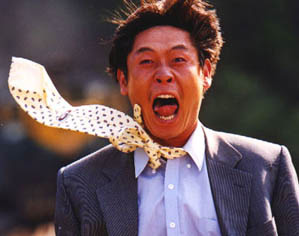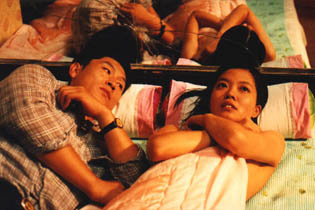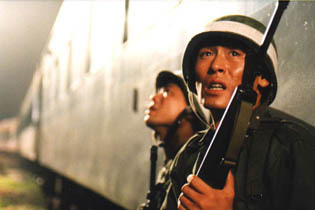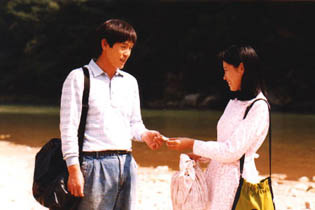Synopsis:
Peppermint Candy is a South
Korean film from 2000, directed by Lee Chang-dong (Green Fish, Oasis, Secret Sunshine),
which tells the poignant tale of a man's life and the factors that
lead to his demise. The main character's story is told in a series
of vignettes which also reference South Korea's difficult transition to democracy during the period and the turmoil faced by both him and his country ultimately has far
greater consequences than he could ever have anticipated.
 |
Review:
The film's scenes run
chronologically in reverse order, from present day back through
time, to finish 20 years in the past:
The first scene we see is set
in the spring of 1999, where a group of former high school friends
gather at a riverbank for a reunion picnic. A man wanders into the
scene and the revelers recognize him as Yongho (Sol Kyung-gu), a
friend whom they had lost touch with years previously. As they
attempt to welcome him they increasingly see that his behaviour is oddly erratic
and, as they watch,Yongho climbs onto a railroad bridge and jumps in
front of an approaching train,
shouting out "I'm going back!" just before the train hits him.
Each successive scene (signalled
by a train travelling backwards) further expands the story of Yongho and
delves into the factors which led to his suicide.
In the first of these his wife Hongja (Kim
Ye-jin) has left him, he's in debt and has acquired a gun to shoot
himself but, before he can, he learns that the love of his life, Sunim
(Moon So-ri), is on her deathbed and has asked to see him one last
time - which leads to an incredibly moving scene of them together in
the hospital, and also explains the significance of the film's title.
 |
The story then continues to jump back
through time to 1994, where we find Yongho running a small business, in the midst of his increasingly unhappy
marriage to Hongja, and having an affair with his one of his employees. A
chance meeting in a restaurant (where Yongho has an encounter with a figure from
his past) then leads into the film's next sequence, set in 1987,
where Yongho is a policeman who beats and tortures confessions from
suspected government dissidents. Hongja is pregnant with their
daughter but it is clear that he is driving her to leave
him.
When we see Yongho in 1984, he is a rookie cop who becomes traumatized following his first beating of a
suspect in order to get a confession, but the moment that really sets the course for his demise comes in
1980 when, as a soldier, his unit is called on to quell a civil
disturbance and he ends up making a fatal error of judgement.
 |
When the film reaches
its end (at the beginning of the story) the year is 1979 and the
setting is the same riverbank seen at the beginning of the film. The
picnickers (including Yongho) are all together discussing their
hopes and dreams for the future.Yongho is clearly a happy and
optimistic young man who dreams of being a photographer and spending
his life with Sunim, the woman he truly loves.
Unfortunately,
having already seen his future, we know that all of his dreams will
disintegrate, he'll lose the love of his life (in more ways than one) and
he will end up a shattered man, lonely and heartbroken on the same
riverbank twenty years later.
Summary:
Peppermint Candy is a masterful and compelling
film which shows how innocence, hopes and dreams can so easily be
lost before the heart even realises what is happening.
Story Background:
The most important turning point in
the development of Yongho's character, during his time as a soldier, is set against the backdrop of the Gwangju
Massacre. This important landmark in the South Korean democratic
movement, in which a clash between government troops and student
pro-democracy demonstrators resulted in 200 dead (mostly civilians),
would result in the arrest and imprisonment of two former South
Korean presidents and echo through the country for years to come.
The Gwangju Massacre is also thought to have triggered the rise of
anti-American sentiment, and it is claimed that the Reagan
administration had strongly endorsed the use of force in quelling
the riot.
During the Eighties, we see Yongho's character
being hardened by the brutal tactics employed by the police at the
time - which was a turbulent period for South
Korea under the leadership of General Chun Doo-hwan, whose
dictatorship kept the country in a state of martial law and blocked
all efforts towards reform.
Finally, in the
Nineties, we see Yongho riding the wave of economic expansion
brought about by the new constitution of 1988, only to come crashing
down during the economic crisis of 1997 when investors abandoned
the debt-ridden South Korean economy, the currency rapidly
depreciated and the country was ravaged by soaring unemployment and
bankruptcies.
However, it should be noted that knowledge of the relevant Korean history is
not needed to enjoy the film, as the situations are fairly self
explanatory on a general level.
Cast & Crew:
Sol Kyung-gu plays the character of
Yongho with incredible depth and makes the character interesting
(and even charismatic) even when we are seeing the portrayal of the
monster he becomes. His innocence and naivety as a young man come
through beautifully and it is almost hard to believe that it is the
same actor. The rest of the cast play very much in the background to
the main protagonist but note should be made of Moon So-ri's
portrayal of Sunim especially in the heartbreaking deathbed
scene.
DVD
Region 1 YA
Entertainment Release
- Actors: Sol Kyung-Gu; Moon So-Ri; Kim Yeo-Jin
- Director: Lee Chang-dong
- Format: Color, Digital Sound,
Dolby, DVD-Video, Full length, Letterboxed, Subtitled, NTSC
- Language: Korean
- Subtitles: English
- Region: Region 1
- Aspect Ratio: 1.85:1
- Number of discs: 1
- Rating: Not rated
- Studio: YA Entertainment
- DVD Release Date: August 17,
2005
- Run Time: 129 minutes
|





